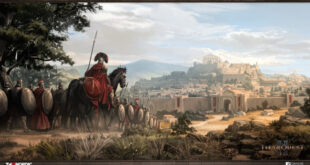As we have seen so far video games have inspired many individuals to get creative, and embark on their own personal projects that showcase their talent. Daniel Lambie is a professional musician but he is also known for his powerful metal renditions of many video game titles.
http://youtu.be/6pP4DiNVKAY

Daniel Lambie grew up in a tiny fishing village called Crail which is located east of Fife Scotland. Because it was such a small community, Lambie said he was desperate to get away and move into a city. Once he finished high school he moved to the country’s capital city of Edinburgh, to study Sound Engineering. Lambie started playing guitar when he was 14 years old, and was always fascinated by studio recording so he jumped at the chance to further that.
When Lambie is not playing or writing music he spends most of his time playing video games or going to see live music performances. A lot of his friends perform in bands so he tries to catch as many local gigs as he can.
Learning to play guitar was no easy task especially since Lambie didn’t take guitar lessons, and he would spend 3 to 4 hours just practicing.
“My mom bought me the music books for Nirvana’s “Nevermind“, System of a Down’s “Toxicity” and Nickleback’s “Silver Side Up”. So I spent all my time trying to learn every song! I would always be looking up music online to learn too. I never took any actual lessons for guitar so I relied on learning other people’s songs to teach myself how to play full stop. Once I started getting into full on metal my practice time increased. Just hours and hours of me playing Metallica badly. I don’t do much deliberate practice as much anymore though. Nowadays if I’m playing guitar it’s usually because I’m either writing music or recording a new cover,” He explained.

Eventually all that practice paid off, and at the age of 15 or 16 Lambie began to play in various bands that would become a major part of his music history.
“I joined a punk band called “3 Losers” as a guitarist. We were essentially a Green Day cover band, even our own songs sounded like Green Day covers. The other members were older than me so the band broke off when they all dispersed off to university. A couple of years after that I joined a sort of Emo-rock band called “Blind to the Truth” as a drummer. I’d dabbled with drums so I took it as an opportunity to learn more. We weren’t very productive performers but we wrote a lot of material together. Again college and university commitments meant that band broke up.”
A few years later Lambie joined a band called “Tempest Flight” as a vocalist, and said that he wanted to give it a go even though he had never tried to scream or growl before.
“It ended up going so well that I stuck with those guys a good few years and established a name for myself as a vocalist. We had a member change and changed our name to “The City Ignites”, and spent a lot of time playing loads of shows all over Scotland. That’s when I found true enjoyment in playing live music. I eventually left that band because I’d moved to Edinburgh and couldn’t commit to the traveling. Shortly afterwards I joined up with an already established band called “Doubts Cast Shadows” as their vocalist,” he said.
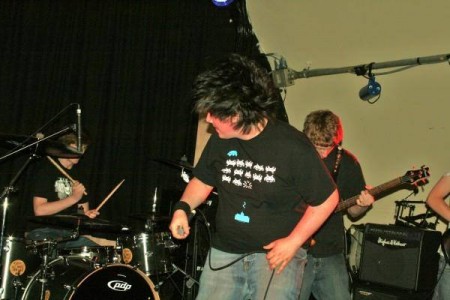
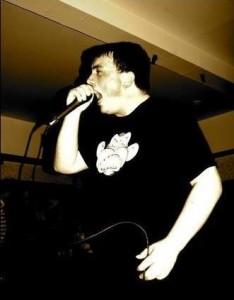
“We didn’t play many shows because we were missing members but I spent a lot of my time with them writing music. Their guitarist Michael Allan was also a budding producer with his own company, and I learned a lot from him about production techniques I still use to this day. I haven’t performed live in a band for a long time and I’m starting the really miss it, so I’m currently trying to figure out a way I could perform my YouTube covers live!”
Lambie soon embarked on a new project, and got his start in creating metal renditions of video game music purely for fun.
“During some downtime from college I thought it’d be an interesting thing to try. Nobuo Uematsu’s Final Fantasy soundtracks are among my favourite songs of all time, which is why first cover was of “The Man With The Machine Gun Arm” from Final Fantasy VIII, and I did it because the song had always struck me as something that would sound great as a metal track. I enjoyed it so much I tried others and it turned into a neat little project. I didn’t even think to make them public for many months after I started.”
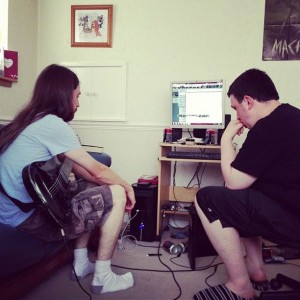
To create metal renditions of video game music Lambie currently uses a Schecter 006 Extreme guitar, but said for the first couple of covers, he had used an Ibanez SA160 which was his very first guitar.
“It was a fantastic guitar, but I changed to the Schecter because after so many years I wanted to try something new. I’ve used my current guitar for about 6 years. It has the standard 6 strings, which I’ve always been used to, but these days my covers are played in considerably low tunings, and slackening the strings that much on my current guitar can be a bit dubious, so I’m hoping to make the upgrade to a 7 string Schecter guitar soon.”
Lambie then explained that the length of time it takes to create a metal rendition really depends on what he’s covering, and walks us through the process.
“When I cover a track I always try to maintain the feel of the original song, so the production time varies depending on the style. After learning the song I’d begin drums first. If it’s an old 8bit style song from Final Fantasy or Sonic the Hedgehog, I’d mimic their original drums exactly. Next is guitar and bass, which are recorded through an amp simulator instead of an actual amp. I have a very small modest setup, so a lot of improvising is usually involved,” he began.
“If it’s an older style song I can have it complete in an afternoon. However when trying to cover a big orchestral piece, e.g. The Last of Us, Batman, Assassin’s Creed, I can spend weeks agonizing over each and every detail because there is so many more instrumental layers involved. Trying to maintain the feel of an orchestral piece in a metal context without using any of the orchestral instruments is very difficult, but much more satisfying when it’s complete. I’ll find myself recording as many as 10+ different guitar tracks in order to mimic 2 string instruments from the original.”
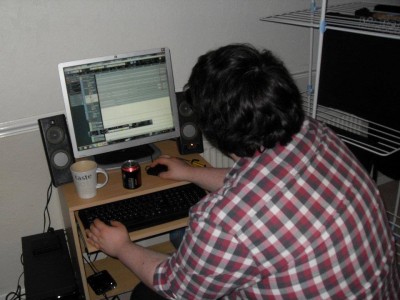
Most often than not musicians tend to experience emotions as they create their pieces, but for Lambie he said that he usually experiences the emotion after he completes the piece, and is looking back at the work.
“If I’m writing my own material, more often than not it’s some sort of crushing metal track, so I’m obviously looking to achieve the need to mosh my living room down. I don’t really approach a writing session with a single riff and just see what happens. Usually I have the whole thing planned out in my head and set about bringing it to life in its entirety.”
He then went onto explain that is different when he is doing a cover, because he is already moved by the original.
Challenges are nothing new when it comes to projects, as every individual runs into them. Lambie shared a few of the challenges he has ran into when creating renditions, and other pieces of music.
“The challenge I’ve found when making these metal covers is making sure that you know the song well enough to really do it justice, doubly so most recently. Nowadays I have people requesting tracks that I’ve never heard before, like Soul Caliber 2 and Castlevania. Obviously if someone has specifically requested a song then they are really passionate about it and will be expecting a certain quality from you based on your previous work,” he said.
“You need to make sure you learn it perfectly so that you can recreate it in a way that will truly satisfy the person who requested it. I don’t like the idea of disappointing someone who requests their favourite tune, so I put it in the extra work to really get it right.”
For anyone that shares their work publically with the world they are susceptible to feedback that is both positive and negative. Lambie shares how he responds to both types of feedback on his YouTube channel.
“I’d be lying if I said I wasn’t totally over the moon anytime someone tells me I’ve done a good job i try to be as interactive with my subscribers as possible. I’m always glad of criticism, because it gives me an opportunity to fine tune my craft A lot of people ask me about certain gear I use and recording techniques and what not, and I’m always as open as possible on that subject in the hope that I can help people with whatever knowledge I have. I’m lucky to be blessed with a fantastic group of subscribers who are just as passionate about the music as I am; it’s always been easy to connect with them”
 BrutalGamer Bringing you Brutally Honest feedback from today's entertainment industry.
BrutalGamer Bringing you Brutally Honest feedback from today's entertainment industry.


